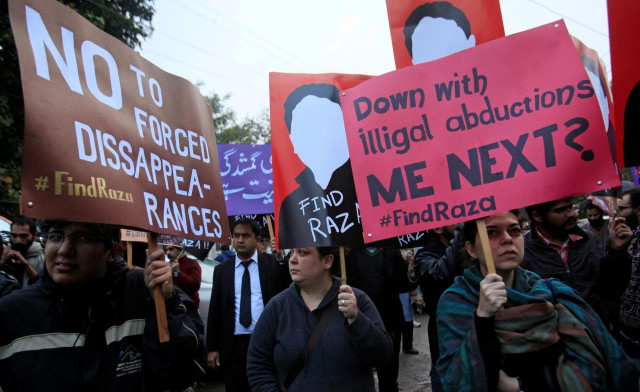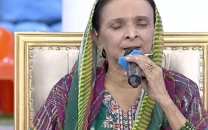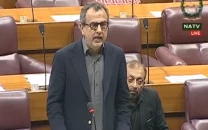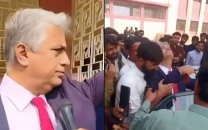Foreign NGOs in Pakistan working in 'unauthorised areas': State Minster for Interior Affairs
Human rights campaigners say the crackdown on NGOs part of a wider campaign to quell free speech

Demonstrators hold placards calling for the release of Raza Mehmood Khan, a member of Aghaz-i-Dosti (Start of Friendship), a group that works on peace building between Pakistan and India, during a protest in Lahore. PHOTO: REUTERS
The Ministry of Interior gave the 27 NGOs 90 days to conclude operations, according to a list seen by Reuters.
Among those being expelled are Action Aid, World Vision, Plan International, Trocaire, Pathfinder International, Danish Refugee Council, George Soros’ Open Society Foundations, Oxfam Novib, and Marie Stopes.
Talal Chaudhry, Minister of State for Interior Affairs, told Reuters the reason for shutting down the NGOs was because they were doing work in Pakistan “which is beyond their mandate and for which they have no legal justification”.
Pakistan orders 29 INGOs to leave country within 60 days
He declined to give specific examples, but said the targeted NGOs spend “all their money” on administration, are not doing the work they said they were doing, and are working in areas where they were not authorised.
The Pakistan Humanitarian Forum (PHF), which represents 63 international aid groups, said the ministry had issued 11 of its members “letters of rejection”. All of them said they will appeal. No reason for the rejections have been provided, the forum said.
Plan International, which has worked in Pakistan since 1997, said it is supporting over 1.6 million children across Pakistan. Plan said it was given no reason for the ministry’s decision and would appeal it.
“The organization is hopeful that the appeals process will make it possible for its work with vulnerable and marginalized children, especially girls, to continue in Pakistan,” it said in a statement.
Women’s rights in Pakistan: NGOs compile report to show the ‘real’ picture
All the other NGOs on the list who responded to queries from Reuters also said they had been given no reason for being forced to shut down.
“They must be having reasons for every (NGO) and those reasons should have been shared with the organizations,” said a representative from one NGO who declined to be identified.
After 9/11
Chaudhry said the number of NGOs in the country ballooned after the Sept 11, 2001 attacks in the United States. Many organizations arrived to provide humanitarian assistance after Islamabad allied itself with the United States in what was then known as the global war on terror.
“But there were also a number of NGOs that are used, knowingly or unknowingly for activities that conflict with Pakistan’s national interests,” Chaudhry said, adding that registration procedures are commonplace in other countries.
Pakistan has hardened its stance towards domestic and international NGOs in recent years, requiring them to undertake a painstaking registration process and clear multiple bureaucratic hurdles to continue working in the country.
The Save the Children aid group fell afoul of the government in 2011, when it was linked to a Pakistani doctor recruited by the CIA to help in the hunt that led to the killing of al Qaeda militant leader Osama bin Laden in the town of Abbottabad.
Interior ministry clears 25 INGOs to work in Pakistan
In January, the interior ministry ordered a dozen domestic groups working on women’s issues and human rights to halt operations, a move later overturned in courts.
Pakistan is hardly alone in cracking down on foreign charities.
Indian Prime Minister Narendra Modi’s government has since 2014 tightened surveillance of non-profit groups, saying they were acting against India’s national interests. Thousands of foreign-funded charities’ licenses have been canceled for misreporting donations.
In China, a law that went into effect on Jan 1 this year grants broad powers to police to question NGO workers, monitor their finances, regulate their work and shut down offices.
The disappeared
The clampdown on NGOs has come after a number of activists disappeared this year, some of whom have not been heard from. Reuters estimates at least 14 people have been picked up and interrogated from major urban centers including journalists, political workers, and social media activists.
Three members of the Human Rights Commission of Pakistan (HRCP) have also disappeared in the past year, chairperson Mehdi Hasan told Reuters.
Human rights campaigners say the crackdown on NGOs and disappearances of civil society activists are part of a wider campaign to quell free speech.
“They both signify the shrinking space for free expression and activism in Pakistan and the diminishing tolerance the Pakistan state has,” Saroop Ijaz, a representative for the Pakistan chapter of Human Rights Watch, told Reuters.
Yusuf, who formerly served as HRCP chairperson, said Pakistan feels it has impunity in dealing with rights groups and activists.
“Its the repositioning of Pakistan as a security state and perceiving all forms of dissent as a security challenge,” Yusuf said.
“It’s creating a lot of fear in society.”



















COMMENTS
Comments are moderated and generally will be posted if they are on-topic and not abusive.
For more information, please see our Comments FAQ